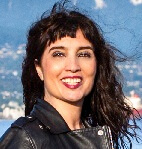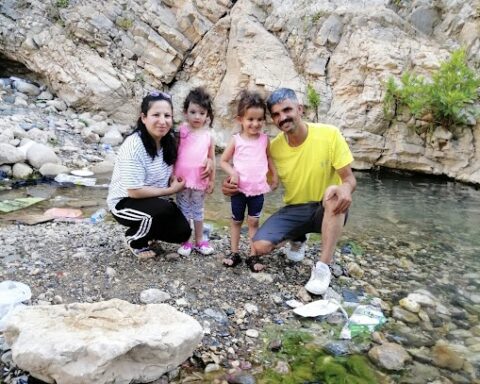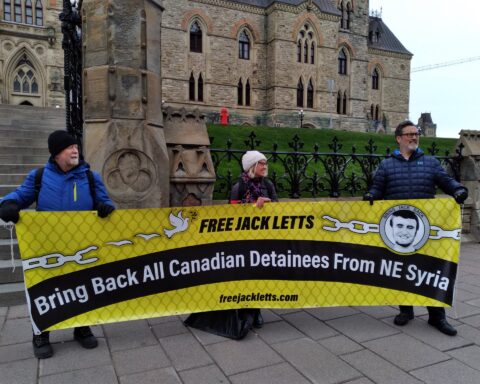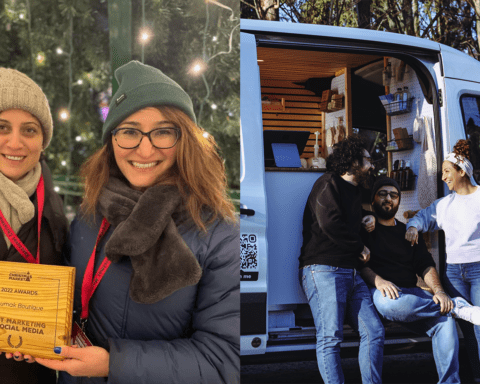As friends in Paris, Beirut and Baghdad reach out to tell me they are safe after recent attacks by Islamic State (IS), a myriad of thoughts and images run through my mind. Huge obscenities and small graces alike.
I think of the billions of dollars that Dick Cheney and his cohorts made on the back of an illegal invasion and occupation that spawned its own counter-barbarism that unleashed itself on three nations this past week.
I think of the shy Iraqi altar boy with a sweet smile I photographed on Christmas Eve in Baghdad in 1998, three days after the Desert Fox bombing by (U.S.) President Bill Clinton.
I think of the massacre of Algerians by French police in 1961 – technically the worst in Paris since World War II. And of the romantic postcard vision of Paris vs. the reality that France is currently the fourth biggest arms exporter in the world with Saudi Arabia its biggest client.
Luxury of security
I think of my friends living in war zones and am reminded of the luxury of security here in Canada and the open-heartedness of those preparing for the arrival of refugees.
And I remember the time I spent living in Paris in the early 90’s. Then, in between writing about Algerian intellectuals fleeing FIS, metro bombings and the cinema of the banlieue, I earned my keep singing on weekends in le Marais – not far from one of the six attacks on Friday.
[I am] reminded of the luxury of security here in Canada and the open-heartedness of those preparing for the arrival of refugees.
Under the old archways of Place des Vosges, I would sing flamenco incantations – often accompanied by a Senegalese pal who chimed in African rhythms (until he got deported back to Dakar). I would also play gypsy songs from war-torn Bosnia and of course — as a patriotic Canadian — the songs of Leonard Cohen.
I think of some now … music as a balm for my soul — and for all our broken hearts — the same songs I sang with friends in Beirut and in Baghdad and Sarajevo that helped stave off the darkness and somehow reach the emotional truth of our war-torn world. As a Palestinian singer from Sabreen once told me, “We have tried every kind of resistance … now all that is left is to sing.”
I remember songs like Stories of the Street “All these hunters who are shrieking now oh do they speak for us?”)
When Love Calls You By Your Name – “Between the newsreel and your tiny pain”
There is a War – “why don’t you come on back to the war, let’s all get even”
And of course the Partisan song Cohen sang of the French resistance – “through the graves the wind is blowing, through the graves the wind is blowing, freedom soon will come.”
Compassion for all
I also remember the (Chilean nueva cancion) Victor Jara songs I used to sing – especially right now – El Derecho de Vivir en Paz (the Right to Live in Peace)
These songs are full of struggle and despair but also of hope – from a time when the Vietnam War raged and atrocities ran rampant. They still lift the human spirit and speak to universal values.
I sing them now silently in remembrance of all this week’s victims, and wonder why this new barbarism can’t spawn once again — instead of more hate — a mass movement of peace, justice and solidarity.
I hope that – like the refugee crisis that has affected so many nations – this fresh new barbarism will be an opportunity for the human family to transcend petty tribalisms and unite in protest and calls for peace, dignity and compassion for all.
I sing them now silently in remembrance of all this week’s victims, and wonder why this new barbarism can’t spawn once again — instead of more hate — a mass movement of peace, justice and solidarity.
Each generation has its horrors and counter-responses. The recent Remembrance or Veterans Day – before it was co-opted for glorification of the military – was a day initiated to refuse war and violence.
Admittedly, compassion is often very selective and culturally determined and really is about who we identify with — mostly. It’s quite an art to transcend that. But I hope by now, we are up to the challenge.
And so as the names of the dead in Paris are slowly, terribly revealed on 24-hour news channels around the world, I say a prayer for them, but also for the nameless in less televisual climes. Those who had the misfortune of being blown up on their way to work, taking their kids to school, shopping in the market, while going to church or praying in a mosque, in some remote corner of a Baghdad suburb, where journalists dare not dine.
I say a prayer for Beirutis, who have lived this so many times before; a prayer for innocent Palestinian families, burned to death by settlers with American passports; a prayer for all the Kenyans, killed in terrorist attacks, who also had names and hopes and families. A prayer for the Rohingyan widows and orphans and those murdered in the name of democracy. A prayer for Yemenis whose wedding parties are routinely bombed to no great alarm.
A prayer for all the Syrians who experience scenes like those in Paris every day and as they flee, are conflated with the very terror they run from. A prayer for us all who struggle to make this life one of meaning and dignity.
May we all sing a Requiem together as one human family, and pierce the darkness with our tears of light.
Hadani Ditmars is the author of Dancing in the No Fly Zone and is working on a new book about ancient sites in Iraq. She has been reporting from the Middle East for two decades and is also a singer and musician.





